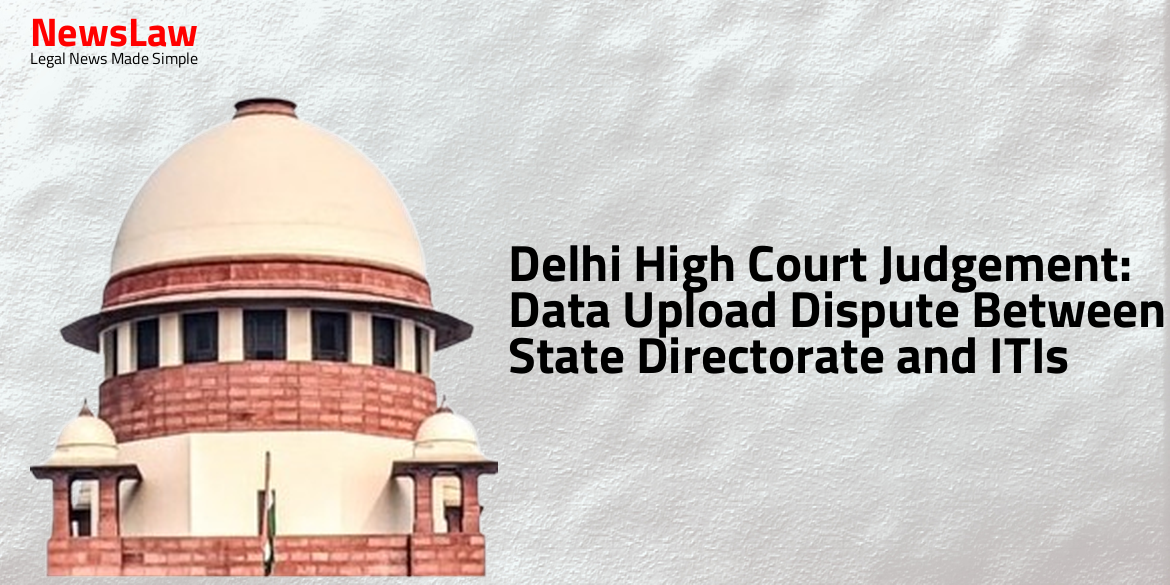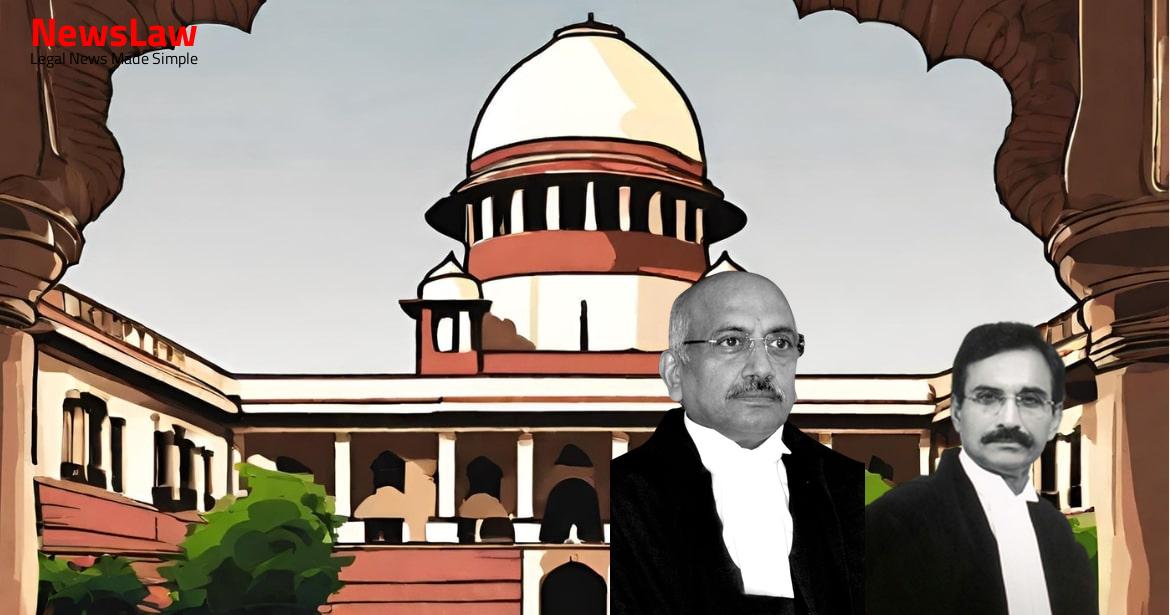In a significant legal case, the Supreme Court of India recently issued a landmark judgment resolving a dispute between a Corporation and a contractor. The Court’s decision set aside the order of blacklisting and restored the judgment of the learned Single Judge. This ruling will have far-reaching implications in contract law and dispute resolution. Stay updated on the latest developments in this case.
Facts
- The High Court set aside the judgment of the learned Single Judge and allowed the Appeal of the respondents.
- The appeal court dismissed the appeal and an application, stating that there was no urgency due to the pending writ petition.
- The High Court allowed the Appeal of the Corporation, supporting the order of debarring the appellant.
- The appellant appealed to the higher court against the High Court’s decision and obtained a stay order on the judgment.
- Contentions were heard regarding the blacklisting decision, with the argument that it should not have been made until the dispute was resolved.
- The High Court mentioned the neglectful actions of the company, which led to the blacklisting decision by the KMC.
- The appellant filed a claim before an arbitrator and received an award after several hearings.
- It was emphasized that natural justice must be followed, and any grievances related to the contract should be resolved through arbitration.
- The impugned order of blacklisting was set aside by the higher court, focusing only on this particular issue.
- The appellant filed Writ Petition No. 261 of 2015 challenging the Show Cause Notice of 28.02.2015 regarding unpaid bills for 5 clusters of Rs. 4,62,67,500 for July to September 2014.
- An appeal (APOT No 89 of 2015) was preferred along with GA No 782 of 2015.
- Under the tender conditions, the contract was for one year with the possibility of two extensions.
- The Corporation issued a show cause notice to the appellant after the contract ended on 30 June 2015.
- A letter from the appellant on 19.07.2014 requested a joint inspection to identify the remaining hoardings as they had found 200 out of 250 allotted.
- The Corporation’s letter of 10.09.2014 stated that the insistence on a Bank Guarantee Format was unnecessary as it was not the payment mode.
- A submission was made to the Court by the Corporation’s senior counsel to withdraw the blacklisting decision and proceed according to the law after providing a hearing opportunity.
- The company later stated they could find 200 hoardings including 26 V-shaped ones, contradicting their earlier claim of only 174 found.
- The Show Cause Notice alleged the appellant’s repeated failure to make payments and perform obligations as per tender terms.
- The appellant requested confirmation for 174 hoardings to proceed with the payment.
- The Writ Petition No. 261 of 2015 related to the show cause notice of February 28, 2015.
- An order was passed withdrawing the show cause notice, with future action to be taken before the Arbitrator.
- Subsequently, a Show Cause Notice on 27.08.2015 demanded payment of Rs. 16,84,34,431 along with interest, citing failure during joint inspections and non-submission of allotted locations list.
- After a series of correspondence and issues raised by the appellant, including non-receipt of work orders and bank guarantee formats, the Corporation demanded payment for June 2014.
- The Show Cause Notice required a response within 15 days failing which appropriate action including blacklisting would be taken.
- The appellant responded stating the Corporation lacked authority to determine breach, and the dispute should be resolved through arbitration.
- An order on 02.03.2016 debarred the appellant from tenders for five years due to alleged negligent performance and non-payment.
- The Corporation served notices demanding payment which the appellant failed to clear, leading to cancellation threats for hoarding allotments.
- The appellant invoked arbitration clause and requested reference to the Joint Municipal Commissioner.
- Non-payment allegations and breach of tender terms were highlighted in the Show Cause Notices and subsequent actions by the Corporation.
- Legal disputes and actions were ongoing between the appellant and the Corporation regarding payments and performance issues.
Also Read: Judgment on Age Relaxation and Bonus Marks in Educational Projects
Issue
- The issue in consideration is the validity and justification of the Corporation’s order dated 02.03.2016, debarring the appellant for five years.
- Blacklisting is deemed a drastic measure and has been closely reviewed by the Court in previous cases.
- The key question is whether the appellant is entitled to any relief in this context.
Also Read: Land Acquisition and Compensation Dispute in Maharashtra
Arguments
- The writ petitioner raised a bona fide dispute, following the ratio in B.S.N. Joshi & Sons Ltd. v. Nair Coal Services Ltd.
- The reasons for blacklisting proceedings should have been based on public interest being affected if contracts were awarded to the writ petitioner.
- The defence raised by the writ petitioner should not be dismissed as lacking merit.
- The writ petitioner’s inability to use the awarded hoardings should have been considered.
- Blacklisting should only occur if the writ petitioner is proven to be dishonest, irresponsible, or lacking in business integrity.
- The Government or a government agency cannot blacklist without providing valid reasons similar to those mentioned above.
- The respondent Corporation has a monetary claim against the writ petitioner.
- The arbitrator framed key issues related to the dispute, such as the bar to the arbitral proceeding due to accord and satisfaction, failure to allot 250 street hoardings, and the nature of the civil dispute between the appellant and the Corporation.
- The appellant argued that the order of blacklisting was disproportionate, citing the judgment in Kulja Industries Ltd. vs Chief General Manager Western Telecom Project BSNL & Ors (2014) 14 SCC 731.
- The counsel for the Corporation supported the blacklisting order and the Division Bench’s judgment, stating that there was no basis for intervention by the Court.
Analysis
- The Division Bench failed to apply the principle of proportionality to the facts of the case.
- Blacklisting should not be resorted to in cases of ordinary breach of contract with a bona fide dispute.
- Debarring a person has serious consequences and should be based on strict legal parameters and proportionality.
- The reasons for blacklisting the appellant did not seem to justify the penalty.
- There were issues between the appellant and the Corporation regarding fulfillment of obligations in the bid document.
- The arbitration award indicated a bona fide civil dispute between the parties.
- The Corporation’s actions were disproportionate and unjustified in response to the appellant’s conduct.
- The Corporation’s failure to terminate the contract within the contract period raises questions about their handling of the situation.
- The Division Bench did not properly appreciate the case and showed fault on the part of the respondent Corporation.
- When a contractor is blacklisted by a department, he is debarred from obtaining a contract.
- The Division Bench failed to correctly appreciate the ratio of the decision in B.S.N. Joshi case.
- No enquiry was conducted by the Division Bench regarding whether the appellant’s conduct was a normal part of business hazards or crossed a line justifying a banishment order.
- Blacklisting can have severe consequences on a business, as seen in the Patel Engineering Limited case.
- Debarment from future contracts may be too harsh a punishment, especially if the company has already rectified the issue.
- Comprehensive guidelines for debarment are issued in the USA to protect public interest from non-responsible contractors or those lacking business integrity.
- Debarment as a remedy is used when there is harm or potential harm for public interest, aiming to deter the person from repeating actions detrimental to public interest.
- Debarment is recognized as an effective method for disciplining deviant suppliers or contractors who commit fraud or breaches of regulations.
- Blacklisting prevents a person from engaging in lawful relationships with the government for gains.
- The Division Bench overlooked a crucial distinction between cases like Patel Engineering and Kulja Industries versus the case in question
- The learned Single Judge had correctly highlighted this distinction
- The petitioner had initially offered to pay a premium of Rs 190.53 crores per annum, but retracted after realizing a lower bid
- The decision to retract the offer may require further investigation to determine if it was bona fide or mala fide
- The explanation given by the petitioner for retracting the offer does not seem rational
- Firm action against such dereliction by the petitioner is essential to prevent recurrence and discourage unwholesome practices in dealings with public bodies
Decision
- The Writ Petition filed by the appellant before the High Court at Calcutta is allowed.
- The order of blacklisting dated 02.03.2016 is set aside.
- No costs are awarded.
- The Appeal is allowed.
- The impugned judgment of the Division Bench dated 21.06.2017 in M.A.T. No 277 of 2017 is set aside.
- The judgment of the learned Single Judge is restored.
Case Title: THE BLUE DREAMZ ADVERTISING PVT. LTD. Vs. KOLKATA MUNICIPAL CORPORATION (2024 INSC 589)
Case Number: C.A. No.-008516-008516 – 2024



